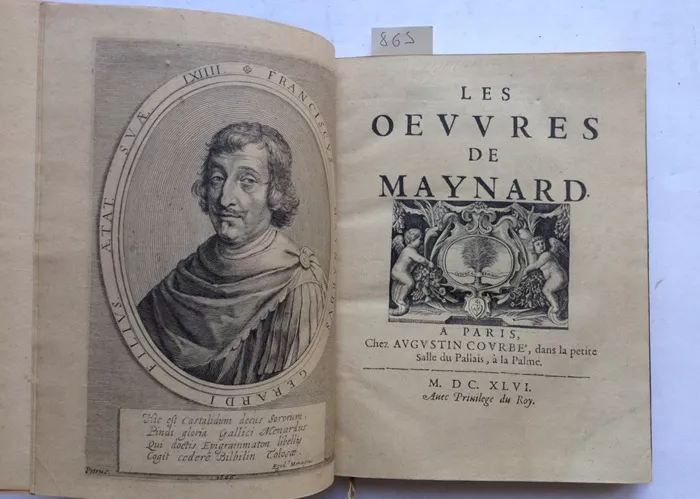François Maynard stands as an important figure in the world of 17th century French poetry. Though he may not be as widely recognized today as some of his contemporaries, his work contributed meaningfully to the evolution of French poetry during a vibrant and transformative period. This article will explore the life, style, and legacy of François Maynard, positioning him within the broader context of 17th century French literature. We will also consider how his contributions compare to those of other poets of the same period, and briefly reflect on the enduring influence of French poetry through the centuries, including echoes found in the works of 20th Century French poets.
François Maynard
François Maynard was born in 1582 in Toulouse, France. His lifetime overlapped with the reign of Louis XIII and the early years of Louis XIV, a time when French culture was experiencing significant growth and change. The 17th century was marked by the flourishing of classicism in French literature, with its emphasis on order, clarity, and restraint.
Maynard pursued a career as a lawyer, which was common among poets of his time, balancing professional duties with literary creation. He was associated with the Académie Française, which was founded in 1635 by Cardinal Richelieu to regulate and promote the French language and literature. Maynard’s involvement with the academy highlights his importance in the literary circles of his day.
The Characteristics of Maynard’s Poetry
Maynard’s poetry is marked by a polished elegance and a careful adherence to classical principles. His work demonstrates clarity of expression, harmonious rhythm, and a sense of measured emotion that aligns well with the classical ideals of his era. He preferred shorter poetic forms such as the sonnet and epigram, where precision and wit were highly valued.
One of Maynard’s notable characteristics was his ability to balance emotional depth with formal control. His poems often explore themes of love, nature, and human experience, yet they avoid excessive sentimentality. This restraint places him alongside other classicists who sought to maintain a decorum in their art.
Comparing François Maynard with His Contemporaries
To better understand Maynard’s place in 17th century French poetry, it is useful to compare him with some of his more famous contemporaries such as Pierre Corneille, Honoré d’Urfé, and Vincent Voiture.
Pierre Corneille is chiefly known for his dramatic works, but his poetry also reflects the classical ideals of grandeur and moral seriousness. Corneille’s poetry often carries a heroic tone, aiming to inspire nobility and virtue. Maynard’s poetry, by contrast, tends toward the intimate and reflective, focusing on personal emotion rather than heroic grandeur.
Honoré d’Urfé, another contemporary, is best known for his pastoral novel L’Astrée, which influenced many poets and writers of the time. His work emphasizes romantic and idealized depictions of love and nature, often with a lush and ornate style. Maynard’s approach is more restrained and less ornate, favoring clarity over elaborate decoration.
Vincent Voiture was famous for his light, witty, and often amorous poetry, popular in court circles. Voiture’s style can be seen as a precursor to the more polished social poetry that flourished later in the century. Maynard’s work shares some of Voiture’s wit but maintains a more formal classical structure.
Maynard’s poetry, therefore, occupies a space between these extremes—less ornate than d’Urfé, less heroic than Corneille, and more formal than Voiture—demonstrating the diversity of French poetry in the 17th century.
Maynard’s Influence on French Poetry
Although François Maynard is less often studied than some of his contemporaries, his influence on French poetry should not be underestimated. His role in the Académie Française helped to shape the norms and standards of French poetic language. This was a critical contribution during a century when French poetry was solidifying its identity as a model of classical elegance and precision.
Maynard’s poetry helped to reinforce the importance of balance between form and feeling, a hallmark of French poetry that persisted well into later centuries. His works served as exemplars of the classical ideal that poetry should be clear, harmonious, and intellectually engaging.
The Legacy of 17th Century French Poetry
The 17th century was a formative time for French poetry. It laid the groundwork for the classicism that defined much of the French literary tradition. The emphasis on order, reason, and decorum during this era influenced generations of poets who followed.
The legacy of poets like François Maynard can be traced into the 20th century, when French poetry underwent significant transformations with the rise of modernism and surrealism. Even in the works of some 20th Century French poets, echoes of classical restraint and formal precision can be found, though often adapted to new thematic and stylistic explorations.
For example, poets such as Paul Valéry and René Char showed an awareness of classical forms and the French poetic tradition, even as they pushed the boundaries of content and style. This connection highlights the lasting impact of 17th century French poetry, including the contributions of Maynard, on the development of French literary culture.
Conclusion
François Maynard remains an important figure in the study of 17th century French poetry. His work exemplifies the classical ideals of clarity, elegance, and balance that characterized the period. Though not as famous as some of his contemporaries, Maynard’s poetry and his role in the Académie Française contributed to the shaping of French poetic tradition.
By comparing Maynard with poets like Corneille, d’Urfé, and Voiture, we gain insight into the diversity and richness of French poetry during the 17th century. Furthermore, understanding Maynard’s place within this tradition allows us to appreciate the enduring influence of classical French poetry on later writers, including notable 20th Century French poets.
In exploring François Maynard’s contributions, we see how French poetry has continually evolved, building on its classical foundations to create a rich and dynamic literary heritage.

